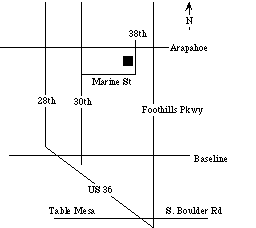 |
Cndnsd Vrsn: 4 PM Thursday 11/20 ACS Room 123- SCons
The next meeting of the Front Range UNIX Users
Group (FRUUG) will be held at 4:00 P.M. on Thursday, November 20.
Joe VanAndel, a member of the FRUUG Executive Committee, will
talk about how SCons provides a much easier way to build
large, multi-platform software distributions than today's make.
The Autoconf/automake/make trio is commonly used to build software on UNIX and
Linux. Because of its various deficiencies, several variants of 'make'
have been built, each with slightly incompatible features. Therefore,
certain types of complex software require a specific variant of make.
The Autoconf/automake tools were written to enhance portability of
software, by automatically generating the appropriate makefile(s) for a
given system. Autoconf, automake, and configure use a mixture of Perl,
Bourne Shell, and the 'm4' macro-preprocessor to build makefiles. The
Bourne shell and 'm4' were chosen because they are available on every
UNIX/Linux system. However, the Bourne shell is NOT well suited for
building large ( 1000+ line) programs, since it lacks many of the
features of a true high level language. Because of the complexity of
these tools, building the proper configuration files can be difficult
and time-consuming.
Although using an existing autoconf/automake configuration or makefile
may not be difficult, programmers who are developing new software spend
far too much time maintaining autoconf/automake configuration files
and/or makefiles. The typical build system based on autoconf/automake
and make is inflexible, and unreliable (How frequently do you type 'make
clean', just to be safe!). Most programmers tolerate the many "quirks"
of these tools simply because they haven't encountered a good alternative.
Scons provides a modern, powerful alternative tool for building
software. SCons automatically scans source files for
dependencies, and uses MD5 checksums (rather that timestamps) to
determine whether an object needs rebuilding. It integrates
autoconf-like functionality. Scons is cross-platform (including
Microsoft Windows). Written in Python, it can easily be
extended and enhanced. It is simple to use for small projects but also
handles complex projects that build multiple libraries and use many
include files.
Joe VanAndel is a programmer in the Atmospheric Technology Division of
the National Center for Atmospheric Research. He writes software to
process and display the data from weather radars. He enjoys programming
in Python.
Joe is a member of the FRUUG Executive Committee. In his spare time, he
enjoys bicycling, digital photography, and working with Flatirons
Habitat for Humanity.
This meeting will be in room 123 of the CU Academic Computing
Center building at Arapahoe and Marine Streets in Boulder. Marine St intersects
Arapahoe at 38th St; the Computing Center is on the southwest corner.

At our October 2003 meeting, John Terpstra did a quick drive-by
of the new features in the Samba 3.0 release, and went into some
detail on how it helps interoperate in Microsoft Windows Active Directory
environments. At the end of the meeting, John demonstrated
how software from Vintela, one of his clients, fills the gaps
between what Samba 3.0 provides and what is really needed.
Announcements, presentation slides, and
writeups for past meetings are be available in the FRUUG Meeting Archive.
www.fruug.org/mtgarchive/index.html.
Some of the meetings we're setting up for the future include:
- A review of the MacOS X 10.3 (a.k.a. Panther) release
- Voice over IP in real-life use
- Sun Microsystem's new Java desktop environment
FRUUG Library Merit Badge
holders can sign up for give-away books by visiting the
FRUUG Web site and clicking on the give-away item in the sidebar.
FRUUG merit badge holders are eligible for our frequent
book give-aways, and all you have to do for a lifetime
membership is to review any book from the FRUUG library
and send the review to gaede at fruug.org.
This month we have two books from Addison Wesley to give away,
The Art of UNIX Programming, and
Next Generation Application Integration.
If you're a FRUUG Library Merit Badge holder and would like
one of the books, please sign up at
www.fruug.org/library/giveaway.html
If you're not, you may check one of these two books out of the
FRUUG library, submit a book review for it, and then keep the book!
Finally, we once again have a
Gift Certificate to SoftPro Books
to give away to a FRUUG member
at the meeting.
New books for the FRUUG library that have arrived
in the last month include:
-
Cisco Cookbook,
from O'Reilly
-
The Effective Incident Response Team,
from Addison Wesley
-
.NET Security and Cryptography,
from Prentice Hall PTR
-
Real 802.11 Security,
from Addison Wesley
-
Secure XML,
from Addison Wesley
-
XQuery from the Experts,
from Addison Wesley
-
The XML Schema Complete Reference,
from Addison Wesley
-
Wireless Hacks,
from O'Reilly
You may check out books using your business card as your
library card; you must be on the membership list to check books out. Books
are due at the meeting following the one in which they are checked out.
Remember that your FRUUG membership entitles you to discounts
on your book orders from both New Riders Publishing and O'Reilly &
Associates; refer to the FRUUG Web site for details.

|
 |



